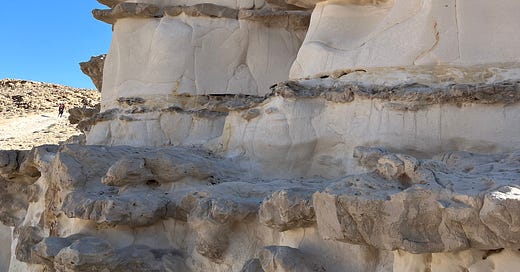
Dear Healthy Jew,
The Jewish people, we’ve learned, is a single human form. Our soul is Israel the Nation, our body Israel the Land.
Every place in Israel is another limb, muscle, or organ of the collective Jewish body, and holds a unique message for healthy Jewish living.
The Vilna Gaon taught how the three major regions of biblical Israel are the three cavities of the human body.
Although we don’t have specific traditions about each of Israel’s body parts, there are many allusions. A famous one is Teveriah (Tiberius), which in Hebrew means navel.
It’s safe to assume, I believe, that Israel’s borders are the land’s skin, where Israel ends and the world begins.
Individual bodies have skin of cells; our national body ends with skin of water and earth. All material life comes with boundaries and limitations.
Who Are You?
Knowing our boundaries is critical for healthy Jewish living - not just where our bodies end, but where we end as people.
If I don’t know what does and doesn’t work for me, I’ll never know who I am, because my identity is enmeshed with everyone around me.
With no clear boundaries, other people can’t know what requests, behaviors, and expectations hurt me. They can’t either help me, because there isn’t any definitive “me” to be helped.
Without personal limits, I can’t be a reliable friend, father, child, sibling, or coworker. Sometimes I’ll try giving what I don’t have to give, helping others until I unravel. Other times I’ll force everyone to go my way because I think I know what’s best for them: how to work, pray, dress, study, talk. After all, we’re all together in “the situation.”
It’s Not About Them
Boundaries are never about “the other person,” or, in Israel’s case, “the other country.” Instead, they are a clear recognition of who I am and who I’m not, what are my abilities and what they are not.
If I’m thinking or talking about what you should do - even how you should respect my boundaries - I’ve left my own borders and entered yours. Nothing good will come from that; it’s like Israel the Nation’s wandering in bitter exile all over the world.
A good rule of thumb is to avoid the word “boundary” when declaring a boundary with another person or group of people. I can only make borders that are about myself, describing what I will or will not do. Don’t “boundary” them, because it’s not about them.
Once in a while, other people won’t like my borders, thinking they’re selfish or misguided. But over time they’ll come to sense I’m a sincere person they can lean on: if my “no” means “no,” then my “yes” means “yes.”
For example, someone might wish to tell a friend or spouse:
“Don’t say that. You are so disrespectful and selfish.”
“You were so mean to me. Go away, you ____.”
With Healthy Jew boundaries, they might say instead:
“I feel hurt when that happens. I can’t continue this conversation.”
“That didn’t work for me. I need space now.”
Finding and setting personal boundaries is hard work, but extremely rewarding. Even if you’ll occasionally forget and invade another person’s space, regularly checking in on who you are and where you end enables you to live a happy, productive, and helpful life.
Similarly, finding the borders of biblical Israel is hard work, and the search is rewarding and fascinating.
Learn much more about this here:
Thank you for reading Healthy Jew.
Here are 2 great paths to continue the journey:
Also check out this intro and index to explore hundreds of posts about our 3 Healthy Jew topics: Wellness with Wisdom, Land of Life (Israel), and Sensible Spirituality.
Finally, always feel free to reach out here with any comments, questions, or complaints:
I look forward to hearing from you!
Be well,
Rabbi Shmuel Chaim Naiman






